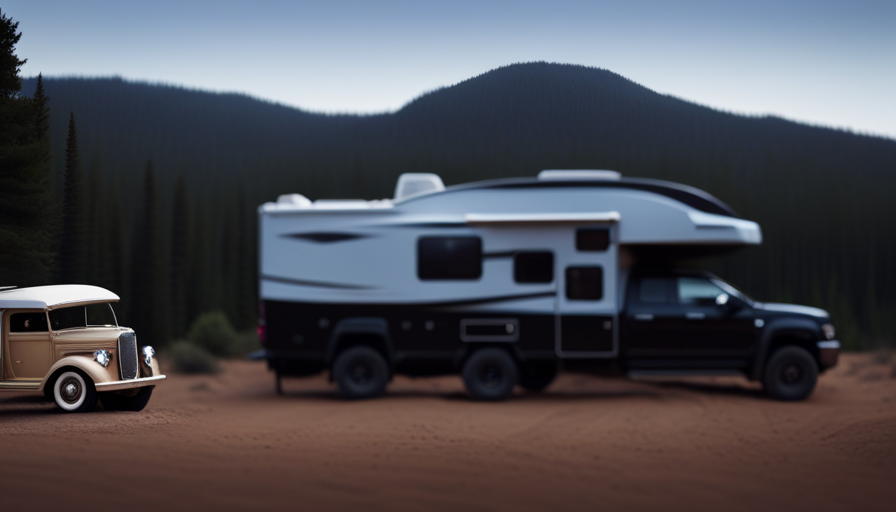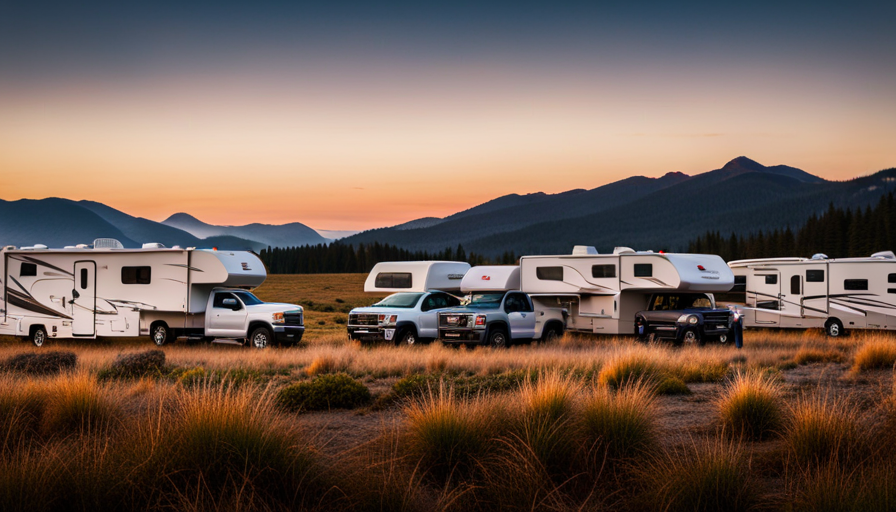Are you prepared to begin the ultimate adventure? Imagine cruising down the open road, feeling the wind in your hair, and having the freedom to explore wherever your heart desires. However, before you can start your journey, there is one important question you must address: what size truck is required to tow a camper?
Now, you might be thinking, ‘Finding the perfect truck is as easy as shooting fish in a barrel!’ Well, my friend, it’s not quite that simple. Choosing the right truck for your camper requires careful consideration of various factors, from the weight of your camper to the towing and payload capacities of different truck sizes.
But fear not! In this article, we will guide you through the process, providing you with all the knowledge and expertise you need to make an informed decision. So buckle up and get ready to discover the truck of your dreams.
Let’s hit the road together!
Key Takeaways
- It is important to consider the weight of the camper and its distribution when choosing the right truck size for towing.
- The towing capacity of the truck should be consulted from the manufacturer’s specifications, with smaller trucks typically having a towing capacity of 3,500 to 7,000 pounds, full-size trucks over 10,000 pounds, and heavy-duty trucks often exceeding 15,000 pounds.
- Other factors to consider include the payload capacity and trailer tongue weight, with mid-size trucks offering better maneuverability and fuel efficiency, while full-size trucks have larger payload capacities and towing capabilities.
- Engine power and torque are important for towing and payload capacities, as higher power ensures smooth towing and high torque generates the necessary pulling force.
Consider the weight of your camper
When determining the appropriate truck size to successfully tow a camper, it’s crucial to take into consideration the weight of the camper.
Choosing the right truck size is essential for ensuring a safe and efficient towing experience. One of the first things to consider is the weight distribution of the camper. It’s important to have a truck that can handle the weight of the camper and distribute it evenly to prevent any potential stability issues on the road.
Weight distribution considerations play a significant role in determining the appropriate truck size. A truck with a higher towing capacity will be able to handle a heavier camper, but it’s also important to ensure that the weight is properly distributed. Uneven weight distribution can lead to swaying or fishtailing while towing, which can be dangerous.
To determine the towing capacity of different truck sizes, it’s necessary to consult the manufacturer’s specifications. These specifications will provide information on the maximum weight that a particular truck can tow safely. By comparing the weight of your camper to the towing capacity of various truck sizes, you can determine which size is the most suitable for your needs.
Considering the weight of your camper and the weight distribution will help you choose the right truck size for towing. Once you’ve determined the appropriate truck size, you can move on to the next step of preparing for your camping adventure.
Determine the towing capacity of different truck sizes
To determine the towing capacity of various truck options, it’s crucial to consider which camper you plan on hitching. Determining towing capacity is essential for ensuring that your truck can handle the weight of your camper safely and efficiently.
Several factors affect towing capacity, including the size and power of the engine, the type of transmission, and the truck’s suspension and braking systems.
When it comes to truck sizes, you’ll find that different models offer different towing capacities. Smaller trucks, such as midsize pickups, typically have lower towing capacities, ranging from around 3,500 to 7,000 pounds. On the other hand, full-size trucks generally have higher towing capacities, with some models capable of pulling over 10,000 pounds. Heavy-duty trucks are designed for even greater towing capacities, often exceeding 15,000 pounds.
It’s important to note that these capacities are general guidelines, and there may be variations based on the specific model and configuration of the truck. Additionally, other factors such as payload capacity and trailer tongue weight should also be considered when determining the right truck size for your camper.
When calculating the payload capacity of the truck, you’ll need to account for the weight of the passengers, cargo, and the tongue weight of the camper. By considering all these factors, you can determine the ideal truck size that will safely tow your camper without exceeding its towing capabilities.
Calculate the payload capacity of the truck
Determining the payload capacity of your ride is like figuring out how much your car can handle in terms of passengers, cargo, and the weight of your hitched adventure buddy. It’s crucial to calculate the payload weight accurately to ensure a safe and comfortable towing experience with your camper.
When calculating the payload capacity of your truck, consider the dimensions of your camper, including its weight and size. To make things more enjoyable and relatable, let’s break it down into two sub-lists:
-
Passenger and Cargo Capacity:
- How many people will be traveling in the truck?
- What other cargo will you be carrying besides the camper?
-
Camper Weight and Size:
- Determine the weight of your camper, including any additional equipment or accessories.
- Consider the dimensions of the camper to ensure it fits within the payload capacity.
By considering these factors, you can accurately calculate the payload capacity of your truck and make an informed decision about whether a full-size or mid-size truck is the right choice for your towing needs. With this knowledge, you’ll be well-prepared to move on to the next section and choose the best truck size for your camper towing adventure.
Choose between a full-size or mid-size truck
Deciding between a big rig or a more compact option can be a tough choice, but imagine the thrill of cruising down the open road with the perfect companion to match your adventurous spirit. When it comes to choosing between a mid-size and full-size truck for towing a camper, there are pros and cons to consider.
A mid-size truck, such as the Toyota Tacoma or the Chevrolet Colorado, offers a smaller footprint and better maneuverability. It can be easier to navigate through tight spaces and crowded city streets. Additionally, mid-size trucks tend to have better fuel efficiency, which can save you money on long trips. However, they usually have a lower towing capacity compared to their full-size counterparts.
On the other hand, a full-size truck, like the Ford F-150 or the Ram 1500, offers a larger payload capacity and towing capability. These trucks are better suited for towing larger campers and handling heavier loads. They also tend to have more powerful engines, providing better acceleration and torque for hauling.
When considering a mid-size or full-size truck, it ultimately depends on your specific needs and preferences. If you value maneuverability and fuel efficiency, a mid-size truck may be the better choice. However, if you require more towing power and payload capacity, a full-size truck would be the way to go.
Now that we have explored the pros and cons of mid-size and full-size trucks, let’s move on to the next step and consider the engine power and torque of the truck.
Consider the engine power and torque of the truck
With the engine power and torque of the truck, it’s like having a wild stallion under the hood, ready to gallop with strength and speed. When considering the size and type of truck you need to pull a camper, it’s crucial to pay attention to the engine power and torque. These factors play a vital role in determining the truck’s towing capacity, payload capacity, and overall performance.
-
Engine Power: A higher engine power ensures that the truck can handle the added weight of the camper effortlessly, providing a smooth towing experience.
-
Torque: Opting for a truck with high torque allows it to generate the necessary pulling force, especially when navigating steep terrains or challenging road conditions.
-
Stability and Handling: A truck with sufficient engine power and torque offers better stability and handling, ensuring a safe and comfortable ride while towing a camper.
-
Fuel Efficiency: While engine power and torque are important, it’s also essential to consider fuel efficiency. Choosing a truck with a balance between power and efficiency can save you money on long trips.
When it comes to selecting the right truck to pull a camper, professional advice and experienced guidance are invaluable. Assessing the stability and handling of different truck sizes is the next step in finding the perfect match.
Assess the stability and handling of different truck sizes
To ensure a safe and comfortable ride while towing, you’ll want to evaluate how different truck sizes handle and maintain stability. Assessing maneuverability is crucial when choosing the right truck size for pulling a camper. Smaller trucks tend to be more agile and easier to maneuver, making them a suitable choice if you plan on navigating tight spaces or winding roads.
However, larger trucks often offer better stability due to their wider stance and longer wheelbase. This can be especially important when dealing with windy conditions or uneven terrain.
Another factor to consider is the impact of truck size on fuel efficiency. Generally, larger trucks consume more fuel than smaller ones. This is because they have larger engines and heavier bodies, which require more power to move. If fuel efficiency is a concern for you, opting for a smaller truck can help save on gas mileage during your camping adventures.
Evaluating the fuel efficiency of the truck is the next step in finding the perfect match for your towing needs. By considering factors such as engine size, transmission type, and aerodynamics, you can determine how efficient the truck will be on the road. Transitioning into the next section, we will delve into the importance of evaluating the fuel efficiency of the truck to ensure an economical and eco-friendly towing experience.
Evaluate the fuel efficiency of the truck
When considering your towing needs, it’s important to assess the fuel efficiency of the vehicle to ensure that your camping adventures are both economical and eco-friendly. Evaluating the cost of maintenance and repairs, as well as comparing the fuel efficiency of different truck models, can help you make an informed decision.
Fuel efficiency plays a crucial role in the overall cost of towing a camper. By choosing a truck with good fuel efficiency, you can save money on gas and reduce your carbon footprint. Additionally, a more fuel-efficient truck may require fewer maintenance and repair costs over time, further lowering your expenses.
To evaluate the fuel efficiency of different truck models, consider factors such as engine size, transmission type, and aerodynamics. Trucks with smaller engines and efficient transmissions tend to offer better fuel economy. Additionally, trucks with improved aerodynamics, such as sleek designs and bed covers, can help reduce wind resistance and improve fuel efficiency.
When it comes to towing a camper, it’s important to take into account the size and type of camper you have. This will determine the amount of weight your truck needs to pull and the towing capacity required. By considering both fuel efficiency and the size of your camper, you can find the perfect truck to meet your towing needs.
Take into account the size and type of camper you have
Consider the unique requirements of your camper and find a truck that perfectly matches its specifications. When selecting a truck to tow your camper, it’s important to take into account the size and type of camper you have.
One crucial factor to consider is the weight distribution of the camper. Ensure that the truck you choose has the appropriate towing capacity to handle the weight of your camper and its contents. This will prevent strain on the vehicle and ensure a safe and smooth towing experience.
Another important aspect to consider is the type of trailer hitch that your camper requires. Different campers may need different types of hitches, such as a ball hitch or a fifth-wheel hitch. Make sure that the truck you select is compatible with the type of hitch your camper needs.
By considering the weight distribution and the correct type of hitch, you can find a truck that’ll provide the necessary stability and control while towing your camper. This’ll enhance your overall towing experience and ensure the safety of both your vehicle and your camper.
As you consider the size and type of camper you have, it’s also essential to think about the terrain and road conditions you’ll encounter.
Consider the terrain and road conditions you will encounter
Take a moment to envision the rugged obstacles and unpredictable weather that lie ahead on our journey with our camper. When considering the size of the truck we need to pull our camper, it’s crucial to take into account the terrain conditions and road conditions we’ll encounter.
Whether we plan to travel through steep mountain passes, navigate sandy or muddy terrains, or face strong crosswinds on open highways, the right truck size can make all the difference in ensuring a safe and smooth journey.
Different terrains require different truck capabilities. For example, if we anticipate traveling through rough off-road terrains, we may need a truck with four-wheel drive and higher ground clearance to tackle uneven surfaces and navigate through obstacles. On the other hand, if we plan to primarily stick to well-paved roads, a truck with good traction control and stability features may be sufficient.
Road conditions also play a significant role. If we expect to encounter icy or snowy roads during our travels, a truck with adequate traction and handling capabilities becomes even more crucial. Similarly, if we’ll be driving on winding or hilly roads, a truck with sufficient power and braking capabilities will provide us with the control and confidence we need.
Considering the terrain conditions and road conditions we’ll face during our camper journey is vital when determining the size of the truck we need. By taking these factors into account, we can ensure a safer and more enjoyable adventure. Speaking of determining the right truck size, seeking advice from a professional or experienced camper can provide valuable guidance in making the best decision for our specific needs and circumstances.
Seek advice from a professional or experienced camper for guidance on the right truck size
To make an informed decision on the right truck for your camper, seek advice from a professional or experienced camper who can provide valuable guidance based on their expertise and knowledge.
When it comes to towing a camper, the size of the truck plays a crucial role in ensuring a safe and enjoyable journey. It is essential to discuss the pros and cons of different truck sizes for towing campers, based on personal experiences.
Smaller trucks, such as mid-sized pickups, may have a lower towing capacity compared to larger trucks. This means that they may struggle to pull a heavier camper, especially on steep or challenging terrains. On the other hand, smaller trucks tend to offer better fuel efficiency and maneuverability, making them a suitable choice for towing lighter campers or navigating narrow roads.
Larger trucks, such as full-sized pickups or heavy-duty trucks, often have a higher towing capacity, making them capable of handling larger and heavier campers. However, they may be less fuel-efficient and more challenging to maneuver in tight spaces.
To navigate through these considerations, it is highly beneficial to consult a professional for guidance on choosing the right truck size for towing a camper. They can assess your specific needs, taking into account factors such as the weight of your camper, the terrain you plan to traverse, and your desired level of comfort. Their expertise can help you find the perfect balance between power, efficiency, and maneuverability, ensuring a safe and enjoyable towing experience.
Frequently Asked Questions
What are some factors to consider when choosing between a full-size or mid-size truck for towing a camper?
When choosing between a full-size or mid-size truck for towing a camper, there are several factors to consider.
First, you need to calculate the payload capacity of the truck, which is the maximum weight it can carry. This includes the weight of the camper and any additional cargo.
Additionally, it’s important to assess the fuel efficiency of the truck, as towing a camper can consume more fuel.
By considering these factors, you can make an informed decision on the right truck size for your towing needs.
How can I calculate the payload capacity of a truck to ensure it can handle the weight of my camper?
To calculate the payload capacity of a truck and ensure it can handle the weight of your camper, there are a few factors to consider.
First, determine the total weight of your camper, including everything inside.
Next, consider weight distribution. Ensure that the weight is properly distributed within the camper to avoid exceeding the truck’s payload capacity.
Consult your truck’s manufacturer specifications and take into account any additional equipment or passengers you plan to carry.
This will help you determine if your truck is capable of safely towing your camper.
What should I evaluate in terms of stability and handling when comparing different truck sizes for towing a camper?
When comparing different truck sizes for towing a camper, we need to consider various stability factors and handling considerations.
Anachronistically, let’s dive into the nitty-gritty.
Stability is crucial, so look for trucks with a low center of gravity and a sturdy suspension system.
Handling is equally important, so opt for models with good maneuverability and responsive steering.
Keep these factors in mind to ensure a safe and enjoyable towing experience.
Are there any specific features or specifications I should look for in terms of engine power and torque when selecting a truck for towing a camper?
When selecting a truck for towing a camper, it’s important to consider specific features and specifications related to engine power and torque. Engine power determines the truck’s ability to pull heavy loads, while torque is crucial for providing the necessary rotational force.
Additionally, you should evaluate the truck’s towing capacity, fuel efficiency, payload capacity, stability, and handling. These factors will ensure that the truck can safely and efficiently handle the weight of the camper while on the road.
How can I assess the fuel efficiency of different trucks to determine which one is most suitable for pulling a camper?
When it comes to assessing fuel efficiency and comparing towing capacity of different trucks, it’s like finding the perfect harmony in a symphony.
To determine which truck is most suitable for pulling a camper, consider factors such as the truck’s engine size, transmission type, and weight distribution. Additionally, look into fuel consumption ratings and aerodynamics.
By carefully evaluating these aspects, you’ll find the ideal truck that balances power and efficiency for a smooth towing experience.
What Size Truck Camper Can Be Towed by a Specific Size Truck?
Determining the appropriate size of truck camper needed for towing depends on the capabilities of your specific size truck. Factors like payload capacity, towing capacity, and trailer tongue weight play a crucial role. Make sure to check your truck’s owner’s manual and consult with experts to ensure you select a truck camper that is within your truck’s towing capabilities.
Conclusion
In conclusion, when it comes to choosing the right size truck to pull a camper, it’s crucial to consider various factors. These factors include the weight of your camper, towing and payload capacity of different truck sizes, engine power and torque, fuel efficiency, and the terrain and road conditions you will encounter. Seeking advice from a professional or experienced camper can provide valuable guidance. Knowing how big of a camper your truck can handle is essential for both safety and performance. It’s also important to consider the overall length and width of the camper, as well as any additional gear or equipment you may need to bring along. Additionally, make sure to research and adhere to any towing regulations or restrictions in the areas you plan to travel.
Remember, finding the perfect truck is like finding the key to a smooth and enjoyable camping experience. So, don’t underestimate the importance of choosing the right size truck – it’s the engine that drives your adventures!










